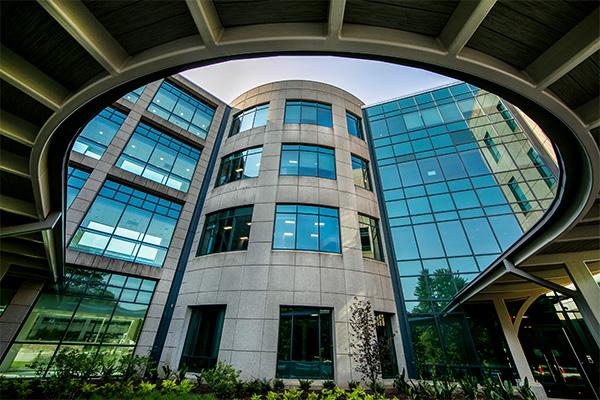
When Thomas Denny, MSc, MPhil, professor of medicine and chief operating officer of the Duke Human Vaccine Institute, looks around the bright, bustling room, it’s even better than he thought it would be. Morning sunlight beams through the floor-to-ceiling windows into the large open-air atrium that is the central point of Duke’s new research campus, Duke Research and Discovery @RTP. Denny was recently appointed associate dean for Duke RTP Administration. He is leading the development of the campus and overseeing the migration of Duke researchers to the new facility.
In the atrium, researchers from Duke University School of Medicine cluster in small groups, discussing scientific questions and challenges. To Denny’s left, a spiral staircase, like a DNA helix, winds through the center of the 273,000-square-foot facility, connecting five levels of wet labs, high-end equipment and biorepository space, and a space to conduct clinical trials in healthy volunteers. Colorful, intricately drawn pictures of genetic material, molecules, and other scientific specimens line the walls around the staircase, a legacy from the building’s former occupants, GlaxoSmithKline.
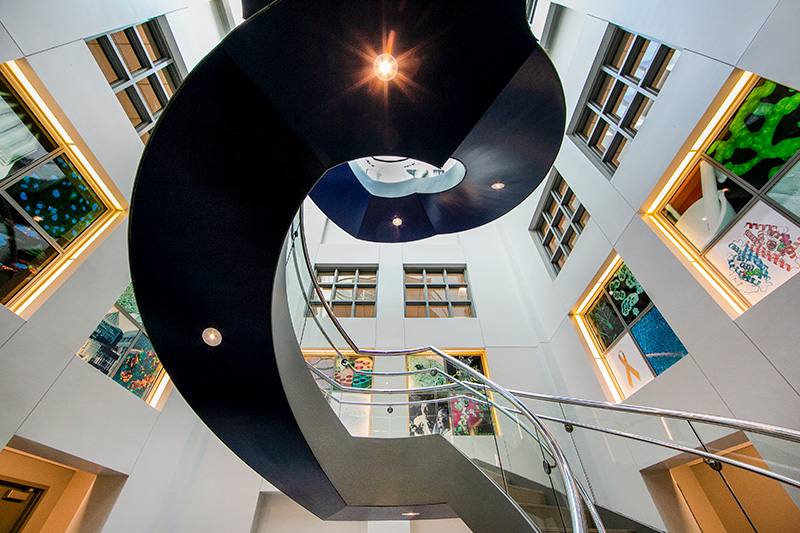
Down the hallway, in the left wing of the building, Denny can hear the grind of a drill and the fresh smell of sawdust that indicates the facility’s final renovations are wrapping up, and all occupants will be able to move in soon. Fourteen principal investigators (PIs) will eventually work in the space, with about two-thirds of them already moved in. These researchers and their team will focus on the transmission and prevention of infectious diseases like COVID-19, influenza, HIV, and more.
Denny looks outside toward the sweeping green landscape of Research Triangle Park, where more than 300 companies, including Apple and Google, have decided to anchor business. This is the spot to be. Denny knows it. For years, he and other infectious disease researchers have dreamed of such a location — a place where true “team science” can take place, where the colleague from a different department who studies the same concept is just down the hall. On top of that, the opportunity to connect with industry partners in health care, science, artificial intelligence, and other key fields is a short walk away.
Bringing Together Bright Minds
In 2020, the federal government awarded grant research money to fund vaccine development to many institutions, including Duke, which received a large, multimillion dollar Collaborative Influenza Vaccine Innovation Centers (CIVICs) grant from the National Institute of Allergy and Infectious Diseases. The Duke Human Vaccine Institute received the grant in 2019 to design and evaluate influenza vaccine approaches, manufacture and evaluate the safety and toxicity of vaccine platforms, and conduct clinical trials for influenza vaccines.
Denny and other Duke University School of Medicine leaders began brainstorming about where the research funded by this grant should take place. Laboratory space on the Duke campus was already filled to capacity. They also wanted to find a space that would spur collaboration among researchers from across the school.
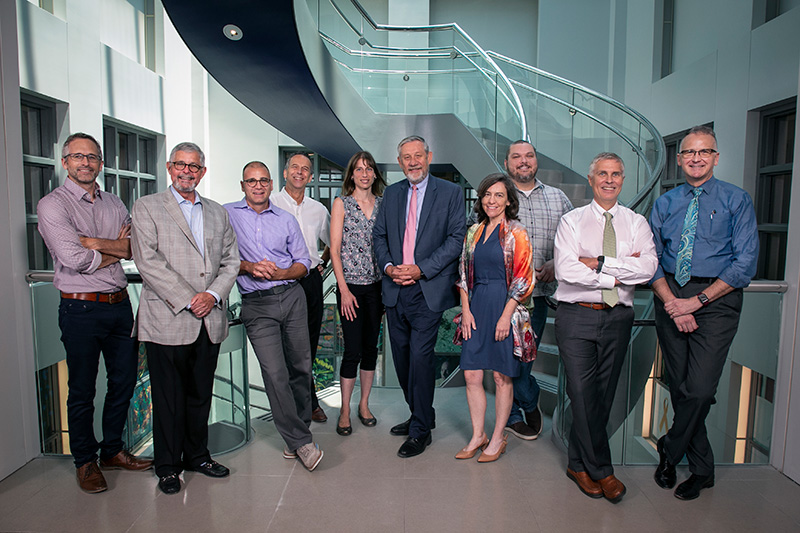
“We realized that the Research Triangle Park was the place to be because of its closeness to the Duke campus as well as it being in the center of one of the country’s leading biotechnology hubs,” said Denny. “This unique setting will facilitate the cross talking of disciplines that’s required to bridge discovery to translational science.”
M. Anthony Moody, MD, professor of pediatrics and immunology; Georgia Tomaras, PhD, professor of surgery; Emmanuel “Chip” Walter, MD, professor of pediatrics; and Greg Sempowski, PhD, professor of medicine, will all have lab space at the campus. As the lead PI for the clinical trials component of the CIVICs grant, Walter will run the clinical trials at the campus.
Denny, who is also on the CIVICs grant, is administrative lead for the new campus and will also have research lab space in the building. He and his team study how infectious diseases like HIV, flu, and most recently, COVID-19, are transmitted. His team helped develop Duke’s award-winning surveillance testing system, which seeks to understand where the virus is on Duke’s campus and how it’s being transmitted and to identify potential hotspots that may require more testing.
Sparking Creativity and Fostering Collaboration
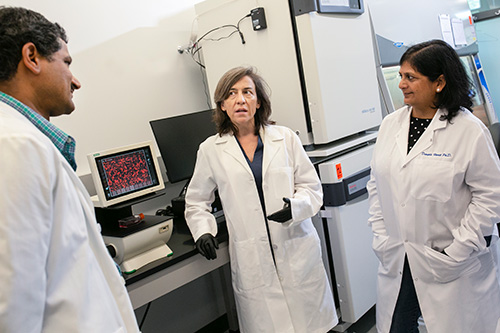
Dr. Georgia Tomaras’ team in the RTP space is focused on studying the types of immune responses that can protect against infection.
“We are keen to understand human immune variation and how to improve vaccine responses in everyone,” said Tomaras. “Duke RTP stimulates energizing work; there are outdoor spaces for lab and clinical scientists to frequently mingle together for the chance discussions that so often spark creativity. Perhaps this will lead to conceiving effective strategies to nudge each person’s immune system toward protective networks of antibodies and cells that are built to last.”
Stephanie Langel, PhD, Instructor, Center for Human Systems Immunology, works together with Dr. Tomaras to identify mucosal correlates of immune protection against emerging viral infections like influenza and SARS-CoV-2. “The Duke RTP campus is the perfect place for this type of research,” said Langel. “Many other investigators at Duke who are experts in infectious diseases will be at RTP, including the CIVICs influenza teams. This will allow for sharing of resources and ideas and fostering collaborations. Additionally, many of the resources I need that I would have found on Duke’s main campus will also be at RTP, including flow cytometry cores, the accessioning unit, and (in the future) BSL3 and animal space. Lastly, it is such a beautiful and enjoyable place to work! The offices and labs are spacious, my office overlooks a beautiful pond, and there are tons of walking trials and greenspace.”
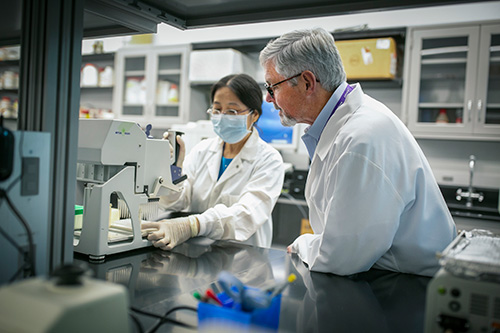
Garnett Kelsoe, PhD, James B. Duke Distinguished Professor of Immunology, will also have a lab on the RTP campus. Kelsoe studies B lymphocytes, the cells that produce antibodies. Kelsoe’s work overlaps with other research happening at the new campus because he studies B cells elicited by both HIV and influenza infection and immunization.
“With respect to our CIVICs grant colleagues, we have looked at B-cell responses in mice and humans to identify antibodies that recognize hemagglutinin (HA) antigens that are present on many influenza groups and types,” said Kelsoe. “Eliciting this sort of broadly reactive antibody is the goal of most efforts to produce a ‘universal’ influenza vaccine. I’m looking forward to working more closely with colleagues who have similar vaccine-related research goals.”
Looking around the new campus, Denny has big dreams for the future of infectious disease research and vaccine development at Duke.
“It’s not just what we’re bringing here,” said Denny. “It’s what we plan to create once we’re here.”
Photos by Chris Hildreth.